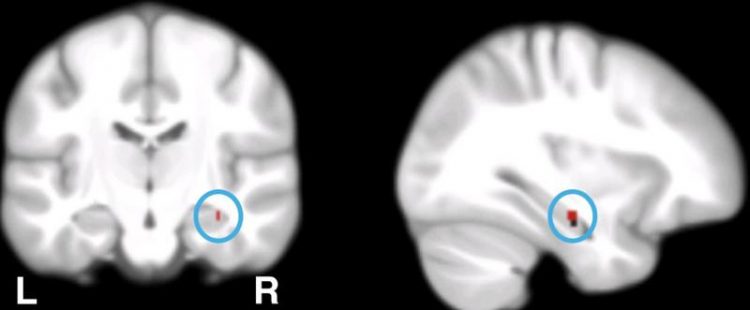Tracking Down the Causes of Alzheimer’s

Researchers from the University of Basel were able to show that memory function (image shows the hippocampus highlighted) depends on calcium-regulating genes. MCN University of Basel
Intact memory capacity is crucial for everyday life. This fact becomes apparent once a memory disorder has developed. Alzheimer’s disease is the most common cause of age-associated memory disorders. Due to increasing life expectancy, the disease is on the rise in Switzerland and worldwide.
Unfortunately, there is no effective treatment to cure or even slow down Alzheimer’s yet. Thus, understanding the origins of this neurodegenerative disorder is key to the development of much needed treatments.
Scientists have known for some years now, that genes do not only play a crucial role in normal memory performance, but also in the development of Alzheimer’s. However, it was so far unclear if specific genes are involved in both these processes.
Researchers at the transfaculty research platform at the Psychiatric University Clinics Basel and the Faculty of Psychology at the University of Basel were now able to show in a large scale study that a specific group of genes controls several processes that are central for regular brain functions as well as for the development of Alzheimer. First author Dr. Angela Heck collected and analyzed data of over 57,000 participants for this study.
Calcium is crucial
The study identified genes responsible for the concentration of calcium ions in the cell as central players of physiological and disease processes in the brain. Calcium genes stand in mutual relationship with memory performance of young and older healthy adults as well as with the function of the hippocampus, a brain region that is central to intact memory.
Furthermore, calcium genes correlate with the risk for Alzheimer disease. The results contribute to the understanding of the complex processes that lead to memory disorders, such as Alzheimer’s.
This study is part of the Basel Genetics Memory Project led by professors Dominique de Quervain and Andreas Papassotiropoulos. The two co-heads of the transfaculty research platform are dedicated to translating basic research results to therapy projects as fast as possible.
Original source
Angela Heck, Matthias Fastenrath, David Coynel, Bianca Auschra, Horst Bickel, Virginie Freytag, Leo Gschwind, Francina Hartmann, Frank Jessen, Hanna Kaduszkiewicz, Wolfgang Maier, Annette Milnik, Michael Pentzek, Steffi G. Riedel-Heller, Klara Spalek, Christian Vogler, Michael Wagner, Siegfried Weyerer, Steffen Wolfsgruber, Dominique F. de Quervain, Andreas Papassotiropoulos.
Genetic Analysis of Association Between Calcium Signaling and Hippocampal Activation, Memory Performance in the Young and Old, and Risk for Sporadic Alzheimer Disease.
JAMA Psychiatry | doi:
Further information:
Prof. Dr. Andreas Papassotiropoulos, University of Basel, Transfaculty Research Platform Molecular and Cognitive Neurosciences, tel. +41 61 267 05 99, email: andreas.papas@unibas.ch
Media Contact
More Information:
http://www.unibas.chAll latest news from the category: Studies and Analyses
innovations-report maintains a wealth of in-depth studies and analyses from a variety of subject areas including business and finance, medicine and pharmacology, ecology and the environment, energy, communications and media, transportation, work, family and leisure.
Newest articles

Scientists transform blood into regenerative materials
… paving the way for personalized, blood-based, 3D-printed implants. Scientists have created a new ‘biocooperative’ material based on blood, which has shown to successfully repair bones, paving the way for…

A new experimental infection model in flies
…offers a fast and cost-effective way to test drugs. Researchers at the Germans Trias i Pujol Research Institute and Hospital have reinforced their leading role in infectious disease research by…

Material developed with novel stretching properties
KIT researchers produce metamaterial with different extension and compression properties than conventional materials. With this material, the working group headed by Professor Martin Wegener at KIT’s Institute of Applied Physics…



